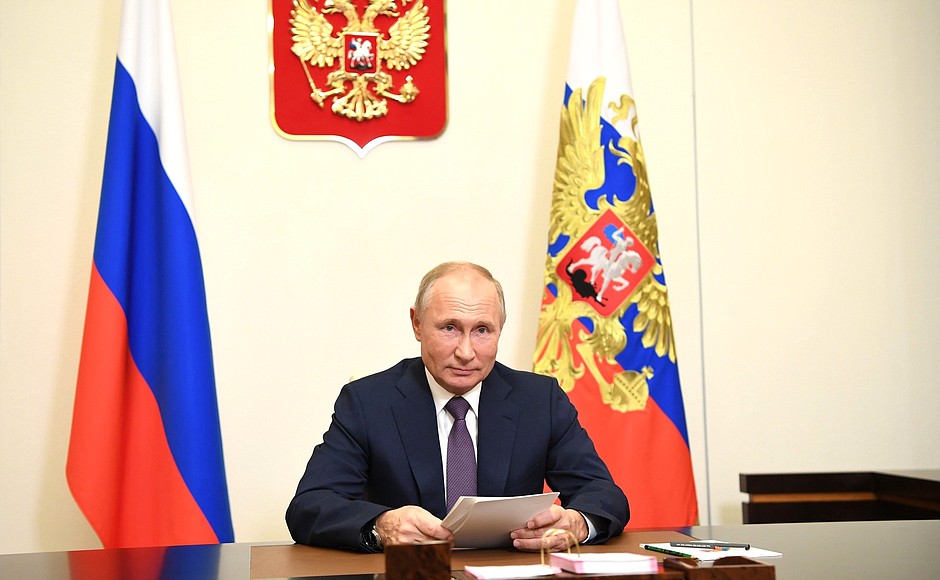
President of Russia Vladimir Putin: Colleagues, friends,
First of all, I would like to sincerely thank all the participants in the Nuremberg Lessons international forum: politicians and government officials, researchers and experts, legal experts, representatives of the museum community and NGOs. I know that you have come from across Russia, as well as from many other countries.
I am certain that the forum’s theme matters to you not only from a professional standpoint, but also in terms of the sense of personal responsibility for preserving the historical truth about World War II. You understand the significance of the Nuremberg verdicts, and the norms and principles these trials helped devise for responding to today’s challenges and threats.
The trials opened 75 years ago, six months after the crushing defeat of the Nazis, and the whole world was watching. The merciless Nazi regime that unleashed the criminal war and committed atrocities of an unprecedented scale may have been defeated, but it was too early to put this matter to rest. The military triumph had to be complemented by a political, legal and moral condemnation of Nazism and its deadly ideology.
Specific people, high-ranking Nazi officials, stood behind the mass terror, bloody killings, enslavement and purposeful extermination of entire peoples. The states that suffered the aggression and the millions of people who had to endure inhuman challenges, pain and suffering, had every right to retribution and the inevitable public punishment of the criminals.
Since 1942, the Soviet Union has been consistently promoting its principled position regarding the establishment of an open International Military tribunal during all the talks it had with the Allies, who, as we know, originally favoured an extrajudicial collective political decision to execute Nazi leaders.
By the end of the war, many leading politicians recognised the need to hold a trial, and in August 1945 the Soviet Union, the United States, Great Britain and France signed an agreement to establish the tribunal. Another 19 countries supported this initiative, giving the tribunal the status of a Peoples’ Court.
Having endured the harshest and most atrocious blows by the aggressor, and having sacrificed so much on the path to Victory, the Soviet people had their own scores to settle with the Nazis, for those who fell on the battlefield, for those who were wounded and mutilated, for the cities that lay in ruins and villages burnt to the ground, and for the mass killings on occupied territory.
These atrocities against Soviet civilians were dictated by special Nazi directives, and were elevated to the rank of state policy by the Nazis. During World War II, the Soviet Union suffered immense, irreparable losses, and among the millions of casualties, the majority were either servicemen who died as prisoners of war or civilians who were fiercely, mercilessly exterminated.
Russia is now proactive in opening up its archives. Alongside search expeditions, this helps uncover and conceptualise the terrible events that took place during this war that remained unknown to this day, as well as uncover facts about mass killings by the Nazis and their henchmen of Soviet civilians, including the elderly, women and children.
Such crimes have no statute of limitations. The Nuremberg Tribunal pronounced its assessment of those acts, and developed the criteria of a crime against humanity, which defined the very concept of genocide and laid the foundation for the 1948 UN Genocide Convention.
The Nuremberg decisions are still relevant today. A month ago, based on those decisions, the Soletsk [district] court in Russia recognised the brutal execution of thousands of peaceful, innocent people near the village of Zhestyanaya Gorka in Novgorod Region as genocide. That was the first such precedent in Russian legal practice.
We constantly refer to the lessons of the Nuremberg Trials; we understand their importance for defending the truths of historical memory, for making a well-founded and solid case against deliberate distortions and falsifications of World War II events, especially the shameless and deceitful attempts to rehabilitate and even glorify Nazi criminals and their accessories.
I will say even more. It is the duty of the entire international community to safeguard the Nuremberg Trials’ decisions, because they concern the principles that underlie the values of the post-war world order and the norms of international law. Even today, they remain a solid and reliable basis for constructive dialogue and cooperation, while forgetting them, or trying to undermine them is a blow to global security. That is why Russia is persistently raising these questions at all negotiating platforms.
I hope that this forum will contribute to a substantive and insightful modern interpretation of the historical legacy of the Nuremberg Trials and that your conclusions and recommendations will be valuable and enjoy interest from the world community.
I wish you fruitful work and all the best.
Thank you.